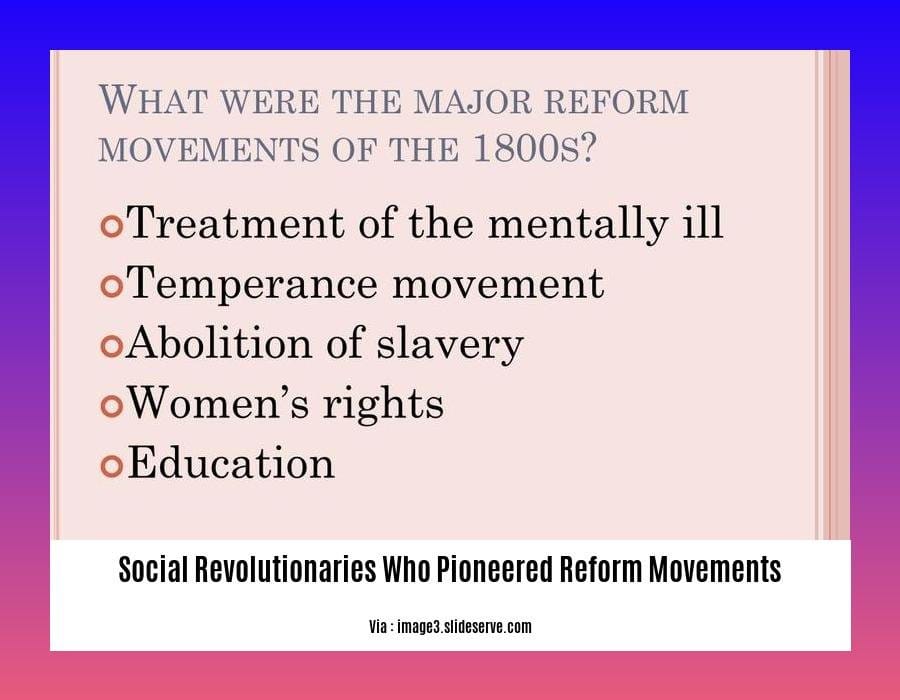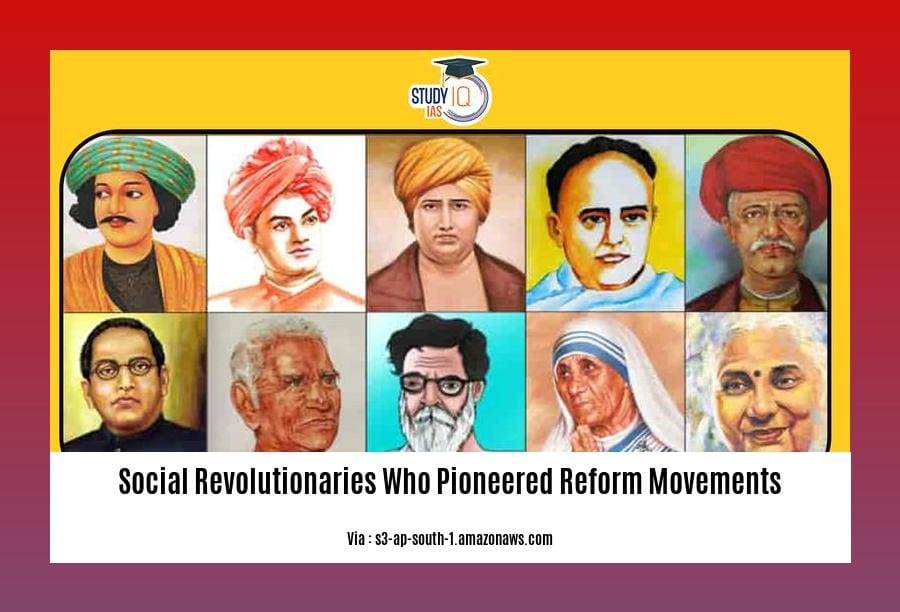Discover the profound impact of social revolutionaries throughout history in our article, “Social Revolutionaries Who Pioneered Reform Movements: Transforming Societies and Shaping Legacies.” Delve into the motivations, strategies, and lasting legacies of influential figures in the Marxist and socialist movements, from the 1850s to the present day, including the Inter-war and Post-war and Cold War eras.
Key Takeaways:

19th-century social reformers like Raja Ram Mohan Roy and Savitribai Phule played vital roles in advocating for social justice, rationality, and progress.
These movements focused on addressing issues like social justice, rationality, and progress.
Reformers challenged oppressive systems, fought for a fairer society, and promoted equality, justice, and progress.
Social Revolutionaries Who Pioneered Reform Movements
Throughout history, social revolutionaries who pioneered reform movements have left an enduring mark by challenging societal norms and driving social progress. From the Civil Rights Movement to the Women’s Suffrage Movement, these individuals have made invaluable contributions to our society.
Motivations and Strategies
Social revolutionaries are often driven by a deep sense of social injustice and a desire to create a more equitable and progressive society. Their tactics vary depending on their specific context, but they often employ nonviolent resistance, civil disobedience, and mass mobilization to push for change.
Impact and Legacies
The impact of social revolutionaries who pioneered reform movements is profound. They have challenged oppressive systems, fought for equality and justice, and shifted the course of history. Their legacies continue to inspire activists and reformers around the world, shaping the fabric of our societies for generations to come.
Prominent Figures of the 19th Century
In the 19th century, social revolutionaries in India played a pivotal role in addressing social issues such as caste discrimination, child marriage, and lack of education for women. Notable figures include:
- Raja Ram Mohan Roy: Championed religious and social reforms, including the abolition of sati (widow burning).
- Ishwar Chandra Vidyasagar: Advocated for widow remarriage and the education of women.
- Swami Dayanand Saraswati: Emphasized rationality and scientific inquiry, promoted social equality, and opposed idolatry.
- Sayyid Ahmed Khan: Founded the Aligarh Muslim University, promoted Muslim education, and encouraged dialogue between Hindus and Muslims.
- Savitribai Phule: Fought for women’s rights and education, established schools for girls.
- Pandita Ramabai: Worked for the education and social upliftment of women, founded a home for widows and orphans.
- Sister Nivedita: Irish-born social worker, devoted her life to India’s education and women’s rights.
Find out more about the pioneering revolutionaries behind reforms and their groundbreaking strategies.
Inter-war era (1917–1939)
During the Inter-war era (1917–1939), a turbulent period of social and political upheaval, several social revolutionaries emerged as beacons of change. Amidst the ashes of World War I, they ignited movements that challenged societal norms and shaped the course of history.
Revolutionary Legacies
These revolutionaries, driven by a deep-seated belief in social justice, challenged the status quo and advocated for transformative change. They mobilized the masses, rallied against oppression, and left an enduring legacy that continues to resonate today.
Key Takeaways:
- Economic disparities fueled social unrest: The aftermath of World War I left Europe reeling from economic instability and political turmoil. These conditions provided fertile ground for revolutionary ideas.
- Totalitarian regimes rose to prominence: The interwar era witnessed the rise of authoritarian governments that suppressed dissent and exploited nationalistic sentiments.
- Social revolutionaries emerged as beacons of hope: Amidst the chaos and despair, social reformers emerged as symbols of resistance and agents of change.
- Their movements had lasting impact: The ideas and actions of these revolutionaries continue to shape contemporary political and social discourse.
Most Relevant URL Source:
Late 20th century and early 21st century (1980s–2000s)
The late 20th century and early 21st century witnessed a surge in social activism, as individuals and movements sought to address pressing societal issues and shape a more just and equitable world. From the fight for civil rights to the rise of environmentalism, this era was characterized by passionate revolutionaries who dedicated their lives to advocating for change.
Key Takeaways:
- Social revolutionaries in the late 20th and early 21st centuries played a pivotal role in addressing economic inequality, promoting social justice, fostering environmental awareness, and fighting for basic human rights.
- These revolutionaries employed various strategies, including peaceful protests, grassroots organizing, legislative advocacy, and international collaboration, to effect change and shape public opinion.
- Their tireless efforts helped to raise awareness of critical issues, bring about legislative reforms, and empower marginalized communities, leaving a lasting impact on society.
Economic Inequality and the Fight for Social Justice
The late 20th century witnessed a widening wealth gap and growing economic inequality. Social revolutionaries like Martin Luther King Jr. and Malcolm X fought for civil rights and economic justice, advocating for equal opportunities and fair treatment for all citizens regardless of race or origin. Their efforts contributed to the passage of landmark legislation, such as the Civil Rights Act of 1964 and the Voting Rights Act of 1965, which aimed to dismantle systemic barriers and promote social equality.
Environmentalism and the Rise of Green Politics
Concern over environmental degradation intensified in the late 20th century, leading to the emergence of environmental social revolutionaries like Rachel Carson and Al Gore. These activists highlighted the impact of human activities on the environment and advocated for sustainable practices to protect the planet for future generations. Their efforts helped raise public awareness about environmental issues and influenced the development of environmental policies and regulations.
Fighting for Basic Human Rights
The late 20th and early 21st centuries also witnessed a rise in global activism for basic human rights. Figures like Nelson Mandela and Amnesty International led movements against apartheid and human rights violations, advocating for equality, freedom, and justice for all. Their work contributed to the establishment of international human rights conventions and inspired countless individuals to fight for the rights of the oppressed.
Citation
Britannica: The Late 20th-Century United States

FAQ
Q1: What were some of the key ideas of the Marxist movement during the 1850s–1910s?
Q2: How did WWII and the post-war era impact the development of the socialist movement?
Q3: What were the major social and political changes that took place during the inter-war era (1917–1939)?
Q4: How did the late 20th century and early 21st century (1980s–2000s) see the evolution of social movements?
Q5: What are some of the enduring legacies of the social revolutionaries who spearheaded these reform movements?
- Mastering Leader in Spanish: The Complete Guide - April 19, 2025
- Uncovering Surprising Parallels: England Size Compared to US States - April 19, 2025
- Old Mexico Map: Border Shifts 1821-1857 - April 19, 2025
















